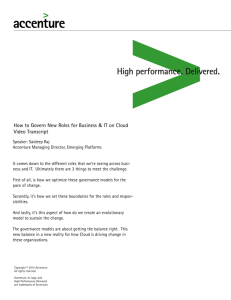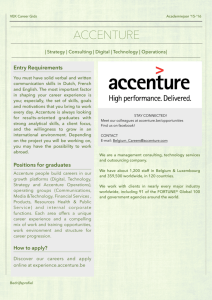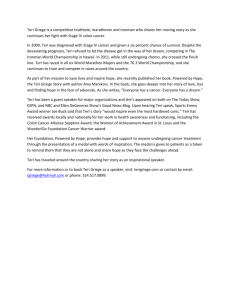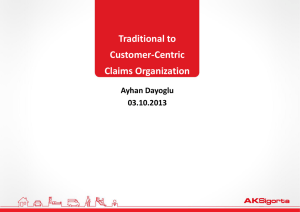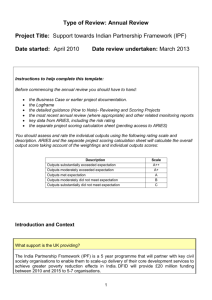The world is changing at a rapid pace
advertisement
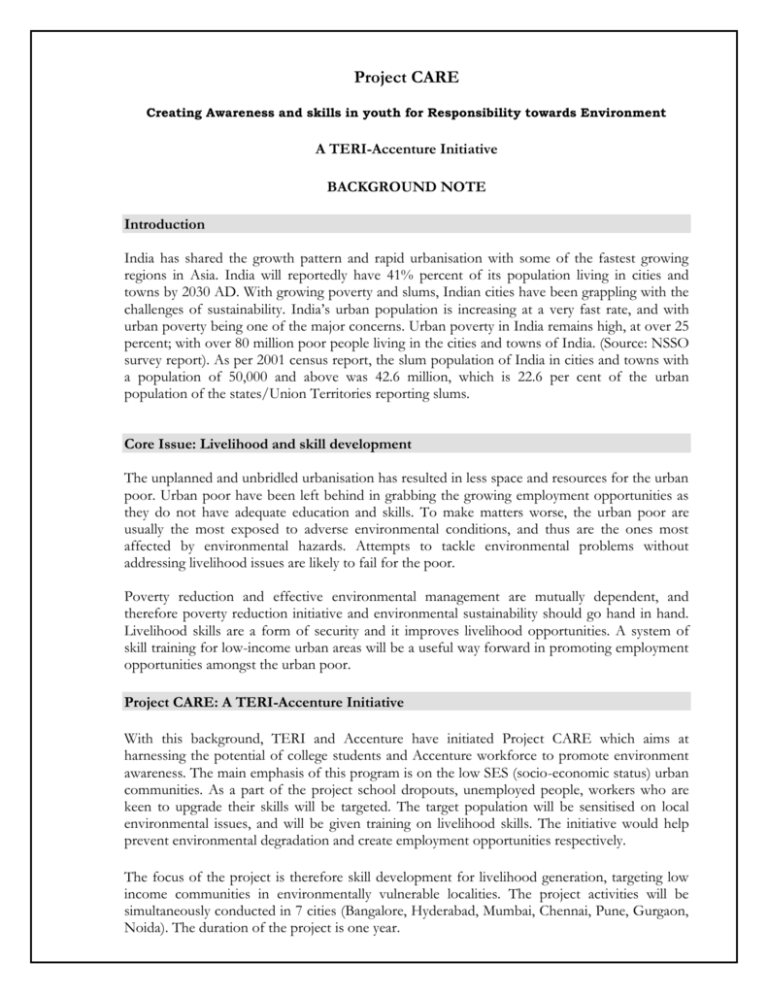
Project CARE Creating Awareness and skills in youth for Responsibility towards Environment A TERI-Accenture Initiative BACKGROUND NOTE Introduction India has shared the growth pattern and rapid urbanisation with some of the fastest growing regions in Asia. India will reportedly have 41% percent of its population living in cities and towns by 2030 AD. With growing poverty and slums, Indian cities have been grappling with the challenges of sustainability. India’s urban population is increasing at a very fast rate, and with urban poverty being one of the major concerns. Urban poverty in India remains high, at over 25 percent; with over 80 million poor people living in the cities and towns of India. (Source: NSSO survey report). As per 2001 census report, the slum population of India in cities and towns with a population of 50,000 and above was 42.6 million, which is 22.6 per cent of the urban population of the states/Union Territories reporting slums. Core Issue: Livelihood and skill development The unplanned and unbridled urbanisation has resulted in less space and resources for the urban poor. Urban poor have been left behind in grabbing the growing employment opportunities as they do not have adequate education and skills. To make matters worse, the urban poor are usually the most exposed to adverse environmental conditions, and thus are the ones most affected by environmental hazards. Attempts to tackle environmental problems without addressing livelihood issues are likely to fail for the poor. Poverty reduction and effective environmental management are mutually dependent, and therefore poverty reduction initiative and environmental sustainability should go hand in hand. Livelihood skills are a form of security and it improves livelihood opportunities. A system of skill training for low-income urban areas will be a useful way forward in promoting employment opportunities amongst the urban poor. Project CARE: A TERI-Accenture Initiative With this background, TERI and Accenture have initiated Project CARE which aims at harnessing the potential of college students and Accenture workforce to promote environment awareness. The main emphasis of this program is on the low SES (socio-economic status) urban communities. As a part of the project school dropouts, unemployed people, workers who are keen to upgrade their skills will be targeted. The target population will be sensitised on local environmental issues, and will be given training on livelihood skills. The initiative would help prevent environmental degradation and create employment opportunities respectively. The focus of the project is therefore skill development for livelihood generation, targeting low income communities in environmentally vulnerable localities. The project activities will be simultaneously conducted in 7 cities (Bangalore, Hyderabad, Mumbai, Chennai, Pune, Gurgaon, Noida). The duration of the project is one year. The following programmes are to be conducted under project CARE: - Initiation workshop – 1 per city - Focus group discussion with communities – 1 per city - Training programmes – 4 per city (2 for colleges/volunteers and 2 for communities) - Final Workshop – 1 per city - 3 Pilot Projects – in the community in any 3 cities (out of 7 project cities) Project objectives The key target groups of the project are college students, Accenture volunteers and communities. The specific objectives of the project are: - Address the problems of environmental pollution and degradation in identified lowincome areas Create awareness among the target groups and initiate action for a cleaner environment Harness the potential of local communities and youth in the quest for a cleaner environment through personal skill development Enhance the ability of the target groups to seek alternate solutions to improve the local conditions. Employ a participatory approach to inculcate awareness and a sense of responsibility among the people towards the environment. Role of participating college students and Accenture volunteers A core group of 20 students from each college, and 20 Accenture volunteers from each city will be identified. The role of college students and volunteers will be: - Help TERI team in identifying the locality, as well as colleges and community in the locality - Help TERI team in identifying the local environmental concerns of the area - Help TERI team in identifying the livelihood skills suitable for communities keeping in mind the project criteria - Enhance their own knowledge on environmental issues and concerns - Build their own capacities on participatory research methods - Build their own capacities on skills for livelihood generation Final Outcome - Sensitized youth capable of imparting knowledge (to underprivileged youth) on green entrepreneurship Communities empowered on environmental issues. About Accenture Accenture is a global management consulting, technology services and outsourcing company. Combining unparalleled experience, comprehensive capabilities across all industries and business functions, and extensive research on the world's most successful companies, Accenture collaborates with clients to help them become high-performance businesses and governments. ‘Skills to Succeed’ provides a focus to Accenture’s corporate citizenship efforts, which enables them to increase the impact their efforts achieve. It combines their passion, experience and constant commitment to developing and nurturing talent. In a fast-changing, multi-polar world, skills are a key driver of economic empowerment for both individuals and communities, and it is more critical than ever to have the right skills to build confidence and capabilities that will open doors to employment and independence. They believe their focus will have a significant and lasting effect on the economic well-being of individuals and their communities. Through aligning their transformed corporate citizenship capabilities behind Skills to Succeed, Accenture has the opportunity to make a substantive, meaningful and sustainable contribution not only for individuals and their families, but for entire communities. About TERI TERI, a not-for-profit, independent research organization, is a dynamic and flexible organization with a global vision and a local focus that was established in 1974. All activities in TERI move from formulating local and national level strategies to suggesting global solutions to critical energy and environment-related issues. It is with this purpose that TERI has established regional centres in Bangalore, Goa and Guwahati, and a presence in Japan, Malaysia, Russia, and the United Arab Emirates. It has also set up affiliate institutes: TERI–NA (The Energy and Resources Institute, North America) Washington DC, USA, and TERI–Europe in London, UK. TERI’s Environment Education and Awareness (EEA) area, has been conducting programmes for the last several years under the following activity heads: Outreach events in schools, colleges and residential areas on environmental issues Development and dissemination of Environment Education resource material, both print and electronic, for various segments of society Extensive dissemination through multimedia and web Networking with like- minded institutes for wider outreach both at national and international levels

